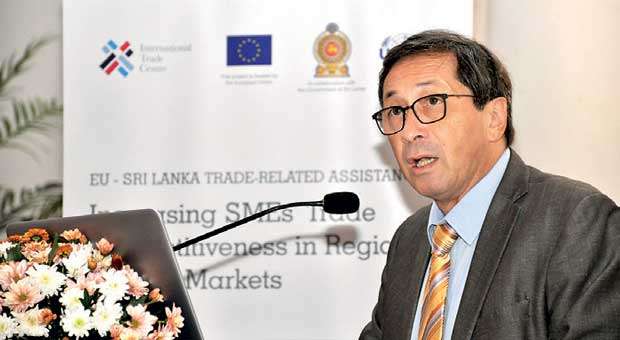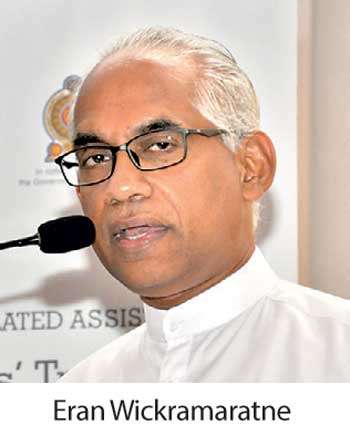03 Oct 2018 - {{hitsCtrl.values.hits}}

EU Ambassador to Sri Lanka and Maldives Tung-Lai Margue
By Shabiya Ali Ahlam
Sri Lanka’s snail-paced efforts towards reforms in the maritime and logistics space was frowned upon by the Europe Union (EU) yesterday, pointing out that “the time is ripe to accelerate structural and regulatory reform” in the island nation.
As the country continues to harp on its ambitious goal of becoming a logistics and maritime hub by 2025, the EU stressed that in a rapidly changing environment where regional neighbours such as India, Dubai and Singapore have intensified their efforts to grab opportunities to increase market share, it is time Sri Lanka stepped up its efforts in realising its ambitious goals and aspirations.
It was pointed out that transforming Sri Lanka into a leading maritime, logistics and distribution hub in the Indian Ocean will require the creation of a conducive business environment and improved infrastructure and services to compete with the likes of Dubai to the west and Singapore to the east.
EU Ambassador to Sri Lanka and Maldives Tung-Lai Margue addressing the first-ever national private – public dialogue on maritime, logistics and transport reforms in Colombo yesterday, noted that given Sri Lanka is well known as a container hub, it must “rapidly diversify its business model to attract other types of ships and related services”, such as multi-model hub providing logistical services for passing cargo such as crew changes, supplying and replenishing of food stock, bonded warehousing, cold storage solutions and packing among others.
“It is undeniable that a well-performing logistic industry unlocks tremendous opportunities for growth of trade. It enables connectivity among intraregional markets, helps meet the demand of a growing e-commerce industry and integrates value added services to obtain higher profitability and increases the country’s competitiveness,” Margue said.
However, it was acknowledged that the government has invested heavily in developing infrastructure, but was pointed out that some completed transport projects in Sri Lanka have not so far met their targets.
Furthermore, with the government in its 2018 budget policy speech having announced the current legal framework for shipping and logistics would be changed to remove government protection, thereby opening up the sector for international players and greater competition, the EU representative asserted the need to implement the said announcement at the earliest as little or no progress have been made in that regard.
Compared with regional peers, Sri Lanka has a lower ranking in the World Bank’s Logistic Performance Index (LPI), where it stands at 94th position amongst 160 countries as of 2018.
Other hubs such as Singapore and Dubai have high and consistent LPI rankings due to having taken measures to stay ahead and relevant.
Shipping sector liberalisation still a priority: Eran
 State Finance Minister Eran Wickramaratne yesterday asserted that liberalisation of the maritime and logistics sector remains a priority for the government, as it would assist in increasing the flow of foreign investments into the country.
State Finance Minister Eran Wickramaratne yesterday asserted that liberalisation of the maritime and logistics sector remains a priority for the government, as it would assist in increasing the flow of foreign investments into the country.
Although the 2018 budget called for the liberalisation of the shipping sector, the proposal is yet to be implemented, leaving industry players impatient.
The call for liberalisation has been on for several years and is yet to be addressed despite the government been given the nod.
While assuring the private sector that their pleas for freedom will be answered, Wickramaratne yesterday listed out the measures the industry should take as a whole to reach the aspired hub status, or at least ensure the initial steps are completed by 2025.
“To become a maritime hub, we need to move from merely providing basic transshipment services to providing more value-added services, which will enable us to drive non-transshipment vessels.
With the ownership restriction being identified as one of the key bottlenecks in developing the industry further, it was said that removing the same will help in bringing in investment, expertise, help enhance the sector, and thereby help develop the country into a holistic destination in shipping activity in the Indian Ocean.
“By removing the 40 percent foreign equity ownership limit, more global firms will invest in Sri Lanka, increasing competition, leading to greater efficiency, lower cost and higher quality of services that would benefit exporters and importers,” he stressed.
Affirming global companies will be incentivized to call more ships to the Colombo port, increasing the flow, he acknowledged the need for liberalisation in order to protect the current market share and transshipment traffic.
“You can either be proactive and act now and continue to grow our market share or look back with regret years later. This is a difficult juncture for this industry, but not new for Sri Lanka. Sri Lanka has been here before.”
17 Nov 2024 1 hours ago
17 Nov 2024 1 hours ago
17 Nov 2024 4 hours ago
17 Nov 2024 5 hours ago
17 Nov 2024 5 hours ago